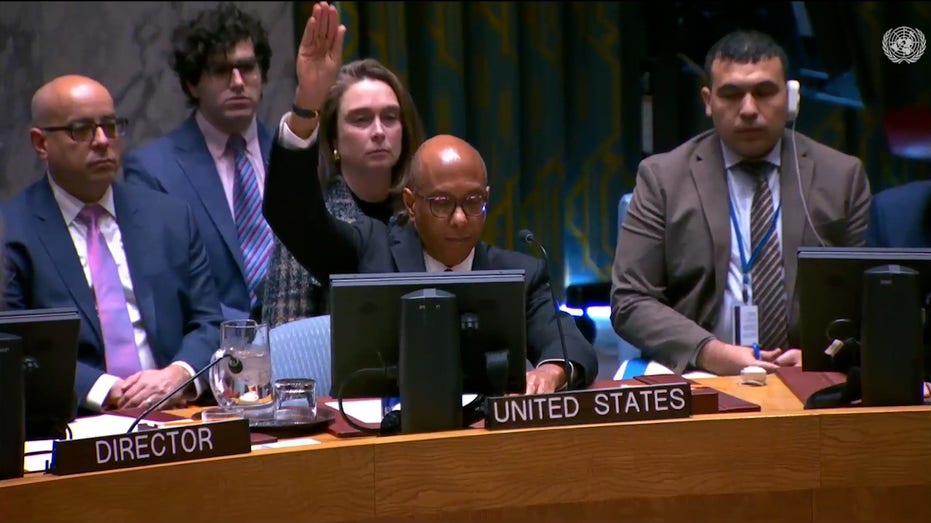
Biden Administration’s UN Veto: A Firm Stand Against Criticism of Israel
In a decisive move that showcases its unwavering support for Israel, the Biden administration recently vetoed a draft resolution at the United Nations Security Council (UNSC) that was critical of the Israeli state. This decision comes amid growing pressures from members of Congress and pro-Israel advocates who have been vocal about their concerns regarding the ongoing conflict in the region.
The Context of the Veto
On Wednesday, the UNSC saw a largely unified front, with 14 out of 15 members voting in favor of a resolution that called for an immediate cease-fire in Gaza. The draft resolution was spearheaded by Algeria and backed by the non-permanent members of the council. However, the resolution was effectively blocked when the United States cast its veto, standing alone as the sole dissenting voice.
U.S. Response: A Defense of Israel and Critique of Hamas
U.S. Ambassador Robert A. Wood represented the country at the session, delivering strong criticism of the draft resolution. Wood suggested that the proposal not only failed to address the critical issue of hostages but also appeared to favor Hamas, a group the United States designates as a terrorist organization. He expressed concern that the resolution would undermine efforts to secure the release of over 100 hostages held by Hamas, including seven American citizens.
Wood’s remarks were pointed, emphasizing that some nations within the Security Council seemed to be pursuing a “cynical” agenda that would exacerbate tensions rather than resolve them. He argued that their goal might not be to help negotiate the release of hostages but rather to provoke further conflict with Israel.
Cease-Fire Controversy
At the core of the draft resolution was a call for an “unconditional cease-fire.” Wood countered this insistence, stating that such a measure would only serve to entrench Hamas’s position in Gaza. “The United States will never accept this,” he stated emphatically, clarifying that endorsing a cease-fire that neglects the issue of hostages could “embolden Hamas” and allow the organization to continue its operations unimpeded.
Reiterating a Commitment to Hostage Release
Displaying ongoing frustration, Wood highlighted that the United States had been actively working to forestall a resolution of this kind for weeks. He reiterated that any support for a cease-fire must include tangible commitments to securing the release of hostages, a stipulation the draft resolution regrettably lacked. “This resolution would have sent a dangerous message to Hamas,” he cautioned, indicating it could be interpreted as a validation of the group’s tactics.
Hamas has held hostages for over 410 days, impacting individuals from more than 20 countries. Wood’s comments included a critical overview of Hamas’s history of violence and its refusal to engage in productive peace negotiations. He highlighted that the resolution’s silence regarding Hamas’s actions was particularly troubling, especially considering the group’s involvement in the deaths of nearly 1,200 individuals, including over 40 Americans, during the brutal attacks on October 7, 2023.
The Split Among UN Members
Following Wood’s remarks, there was a notable reaction from other council members. French Ambassador Nicolas de Rivière lamented the failure of the resolution, pointing to the deteriorating humanitarian situation in Gaza. He described the crisis as “disastrous” and “worsening day by day,” underscoring the need for an “immediate and permanent cease-fire” to alleviate suffering and promote adherence to international humanitarian law.
Political Implications
The veto received backing from various political figures within the U.S. Earlier this week, Senator Ted Cruz, a Republican from Texas, warned of what he deemed “a series of assaults on Israel” being orchestrated through the United Nations. He pledged to collaborate with fellow Republicans and President-elect Donald Trump to counter forthcoming resolutions that might undermine Israel’s position. Cruz’s promise of “firm action” included potential aid cuts and sanctions against those backing anti-Israel measures.
Conclusion: A Complex Landscape
The Biden administration’s veto illustrates the complex and often contentious landscape of international diplomacy regarding Israel and Palestine. As the situation continues to evolve, the administration faces pressure from both sides: advocates demanding humanitarian relief for Gaza’s residents and those urging unwavering support for Israel’s right to defend itself against terrorism. The outcome reflects a broader struggle within international politics over how to balance humanitarian concerns with national security interests.
As the conflict persists, the implications of this veto will likely resonate throughout diplomatic circles and influence future resolutions and discussions on the Israel-Palestine conflict.


















